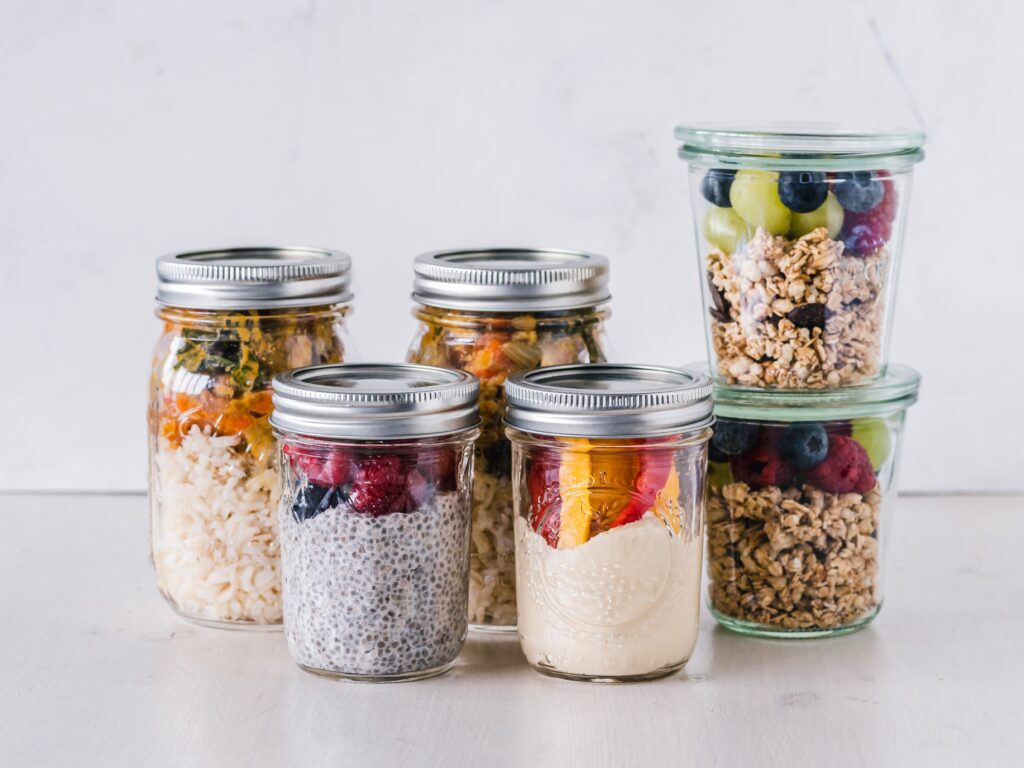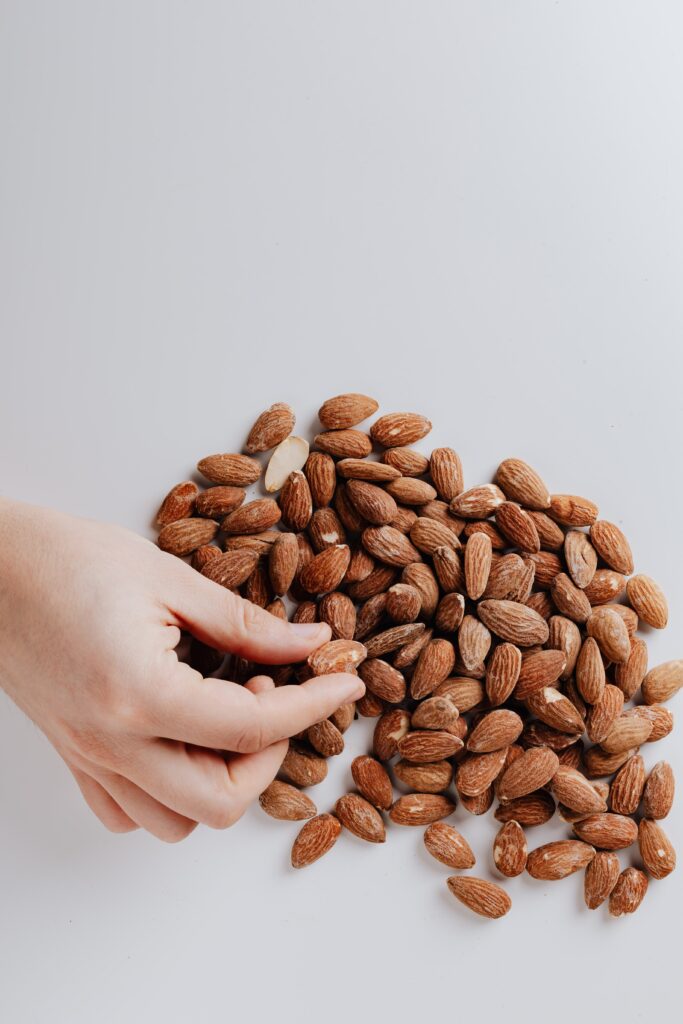
You have probably heard of the benefits of high fiber foods for weight loss and gut health, but did you know it can also have great benefits for your hormones?
It’s true, fiber is crucial for hormonal health and could be the gap missing in your diet!
Only 9% of women are getting enough of the daily recommended fiber intake.
Not eating enough fiber not only increases your risk for chronic diseases like heart disease and diabetes, but also negatively impacts your hormones and can increase insulin resistance.
Fiber is arguably one of the most important nutrients you can add into your diet.
In this blog post we dive into what fiber is, how it affects insulin resistance and hormone health, and some tips for increasing your fiber intake!
As a hormone nutritionist, I am constantly looking for fun and delicious ways to incorporate fiber into mine and my clients’ diets. Check out my other blog posts for recipes and tips for hormone health!

What is Fiber?
Dietary fiber is a type of plant carbohydrate that your body cannot digest. Unlike other carbohydrates which are broken down into glucose or sugar molecules in your body, fiber passes through your digestive tract relatively untouched.
The indigestible property of fiber is what makes it so beneficial for healthy digestion, blood sugar regulation, hormone health, and so much more.
There are two main types of fiber: soluble fiber and insoluble fiber.
Soluble Fiber
Soluble fiber absorbs water and forms a gel in your digestive tract making stool easier to pass.
By absorbing water and allowing stool to swell, soluble fiber slows the digestion of carbohydrates helping to keep you feeling fuller longer and preventing blood sugar spikes.
Soluble fiber has many other benefits as well. It can lower your cholesterol levels by binding to the molecules and passing it through your stool, decrease your blood pressure, and help manage symptoms of IBS!
Insoluble Fiber
Insoluble fiber doesn’t form a gel but adds bulk to the stool. It draws water to the colon making stool softer and easier to pass.
While soluble fiber slows the movement of stool, insoluble fiber allows the stool to move faster through the digestive system.
Both forms of fiber are essential and work together to support healthy excretion.
How Much Fiber Do You Need?
The amount of fiber you need varies by individual. The general recommendation is to aim for 25 grams of fiber each day for women under 50 years old, and 21 grams for women older than 50.
It is important to remember, however, that everyone tolerates fiber differently. Especially when you are first trying to increase your fiber intake, you may not be able to tolerate the recommended amount if your fiber intake was low before.
Start slow and gradually increase your fiber intake to prevent unwanted symptoms. While too little fiber can cause symptoms of gas and bloating, so can too much! Find your happy medium of what your body can tolerate.
How Does Fiber Help with Insulin Resistance?

To start, let’s go over what insulin resistance is…
Insulin is a hormone released by the pancreas in response to your body breaking down food into glucose.
When you are insulin resistant, your body does not respond properly to insulin causing the glucose from your food to remain in your bloodstream instead of being used by your cells for energy. This can lead to a cascade of chronic health conditions including diabetes and weight gain.
The good news is, high fiber foods can help balance blood sugar levels! Your body handles fiber differently than it does other refined carbohydrates.
Fiber is unable to be digested and broken down into sugars like other carbohydrates are. Because of this, fiber is less likely to cause a blood sugar spike since it is not broken down into sugar!
The difference in digestion means insulin is not needed to utilize fiber. This has been shown to help decrease insulin resistance and increase your insulin sensitivity when fiber is consumed abundantly.
How Fiber Affects Your Hormones
Fiber helps to keep your digestive system running smoothly. Not only does this mean keeping the food you eat moving throughout your body, but it also means excreting toxins and excess hormones!
The main reason fiber is needed to balance hormones is because of estrogen.
Estrogen is one of your main female sex hormones and has many roles from regulating your menstrual cycle to keeping your hair, skin, muscles, bones, and brain healthy and functioning optimally!
Estrogens are active compounds and when their job is done, they must be converted to an inactive form and removed from the body. Estrogen metabolism is no simple process and is mostly done in the liver using chemical processes like hydroxylation and methylation.
Many things can disrupt this detoxification process of estrogen such as:
- Blood sugar dysregulation
- Poor liver function
- Gut dysbiosis
- Poor diet
These factors put you at a greater risk for improperly excreting excess estrogen which leads to hormonal imbalances.
Why You Need High Fiber Foods to Balance Your Hormones

If you are not consuming enough fiber you will not be able to detoxify estrogen adequately. Instead of excreting excess estrogen through your stool, the estrogen will remain inside and recirculate throughout your body again.
This could lead to a hormonal imbalance known as estrogen dominance; when you have more estrogen as compared to progesterone.
Signs and symptoms of estrogen imbalances include:
- Digestive problems
- Acne
- Weight gain
- Low libido
- Headaches
- Hot flashes
- Irregular periods
In my practice I utilize the DUTCH test to assess whether you are properly metabolizing estrogen. Head to my services page for more information!
Eating enough fiber is one of the easiest ways to ensure you are excreting excess estrogen. If you aren’t having a daily bowel movement your body is most likely not detoxifying excess hormones as it should be which can be leading to your hormonal imbalance symptoms!
How Does Fiber Help PCOS?
Polycystic ovarian syndrome (PCOS) is a hormonal imbalance condition that also has a strong metabolic component. Therefore, increasing dietary fiber can be extremely beneficial as one of the lifestyle changes to help manage your symptoms.
Not only will fiber help metabolize and excrete excess hormones like estrogen, it will also help to decrease your insulin resistance which is one of the main driving factors of PCOS.
If you have PCOS, eating enough fiber is a critical component to help manage your symptoms.
Psst… Check out my dietary recommendations for PCOS as a dietitian nutritionist!
What Foods Have Fiber?

Fiber should be included in every hormone balancing plate.
As a reminder, a hormone healthy plate should include a protein source, fiber, and healthy fat.
So, what foods contain fiber?
- Whole Grains: quinoa, brown rice, oats, buckwheat
- Vegetables: broccoli, brussel sprouts, spinach, kale, asparagus, etc.
- Fruits: apples, berries, mangos, oranges, bananas, etc.
- Beans: chickpeas, black, pinto, kidney
- Nuts/Seeds: sunflower seeds, pumpkin seeds, chia seeds, almonds, cashews, walnuts
Foods that lack fiber include simple carbohydrates. These are foods like:
- Baked goods
- White bread
- Packaged sweets
- Pop/soda
5 Tips to Increase Your Fiber Intake
Getting enough fiber in each day does not have to be difficult! Here are my top 5 tips to increase your fiber intake.
- Include a serving of vegetables at each meal.
- Choose whole grains.
- Snack on fruits, nuts, or seeds.
- Eat the peel!
The peel of fruits and vegetables often contain over 50% of the fiber. Leave it on and reap the benefits!
- Choose whole foods over processed.
In my practice I use a food as medicine approach to heal the body from within. Eating whole foods high in fiber is one of the greatest remedies I recommend!
The Takeaway: Could Fiber be the Missing Link?
If you struggle with insulin resistance or hormonal imbalances, take a look at your fiber intake. Dietary changes can make a HUGE difference in your symptoms and increasing fiber should be one of the first changes to be made.
Elimination is the biggest way your body detoxes and eliminates. Help it do its job by eating enough fiber!
While you may want to go out and start loading up on the fiber, remember to take it slow. Your digestive system needs to adjust to the new amounts of fiber which could take time. There IS such a thing as too much of a good thing!
Drinking plenty of water can help flush your system and keep things moving as well.
As a hormone and gut health nutritionist I help many clients fill the gaps in their diet, balance their hormones, and improve their gut health. If you are tired of the constant trial and error let me help guide your health journey and finally get the answers you deserve!
